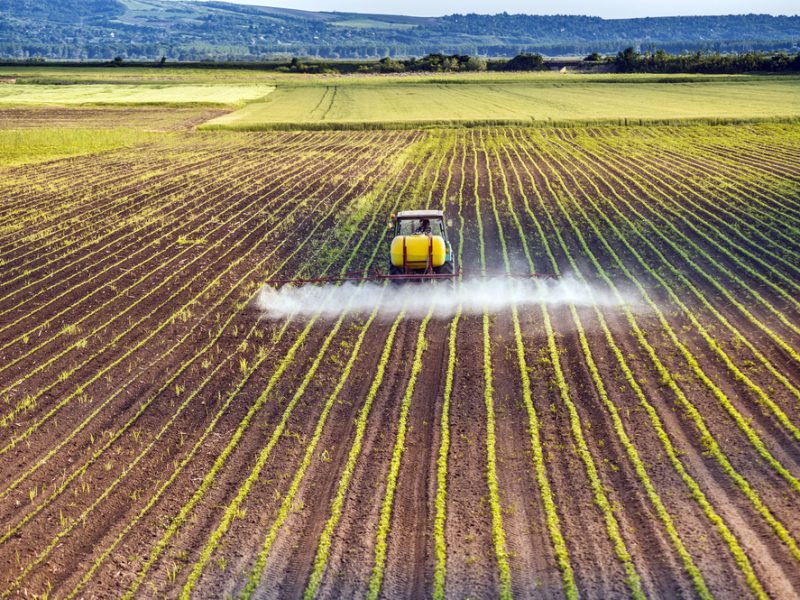Several EU agriculture minister remain unconvinced about EU plant protection products reduction targets and pesticide bans following the publication of a new European Commission impact assessment, while other countries have urged them to stop delaying the negotiations.
On Tuesday (25 July), food safety commissioner Stella Kyriakides presented the Commission’s new impact assessment on pesticide reduction plans to the EU-27 agriculture ministers during their monthly gathering in Brussels.
The EU executive had already conducted an impact study ahead of its proposal for a Sustainable Use Regulation (SUR) to slash pesticide use in half by 2030 tabled in June last year, but EU ministers agreed in December to request fresh information on its consequences for global food security.
The additional study “confirms that a significant reduction in pesticide use and risk can be achieved, and indeed has been already achieved without disrupting food security, food production, and the availability of prices,” Kyriakides told ministers.
“[I]n fact, it further confirms that in the long term, the cost of inaction will be much higher than the cost of action,” she added, stressing that the information provided in the study “represents all existing evidence available to the Commission on the topic at this stage.”
Despite the Commission’s hopes to speed up the stalling reform thanks to the new data, a majority of ministers argued that this was still not enough.
“It is important to note that for the reduction targets and their impact on sensitive areas, we need more and more conclusive studies and data in order to really make decisions on a quantitative impact,” said Austria’s representative Gregor Schusterschitz.
Likewise, the Italian and Hungarian delegations also pointed out that the impact assessment “did not provide the clarifications that were requested” and therefore “it makes it difficult to retain the level of ambition.”
A ‘sensitive’ issue
One of the main points of difference among ministers stems from the Commission’s proposed ban on all pesticides in so-called ‘sensitive areas’ – such as urban green areas, protected Natura 2000 sites, and other ecologically sensitive areas for pollinators.
Several delegations, such as the Danish, Dutch, Croatian, and Estonian requested that the definition of ‘sensitive areas’ be discussed and broadened to reduce the potential impacts of a ban.
“The definition of a sensitive area is simply too broad,” said Danish ambassador to the EU Søren Jacobsen, adding that “future discussion should include modification of the definition of sensitive areas.”
In addition, Carla Boonstra, agricultural counsellor for the Netherlands, suggested “a differentiated approach in which different rules apply to different categories of sensitive areas.”
Contrarily, French agriculture minister Marc Fresnau asked to ensure “harmonised rules that can be applied […] and have a proportionate risk for these different areas.”
Diverging views on national targets
Another bone of contention was the setting of mandatory reduction targets at a national level, as ministers argued that there should be room for flexibility within each member state to take national specificities into account.
For many countries – such as Italy, Hungary, Poland, Czech Republic, Slovakia, and Finland – mandatory national reduction targets are “not realistic at all” and would risk “distortion of competition conditions”, according to Luigi d’Eramo, Italy’s agriculture minister.
Polish agriculture minister Robert Telus also said that “member states should not be subjected to obligatory reduction targets” and “should have the option to contribute to European targets, but based by or based on their local circumstances.”
However, countries like France and Germany are in favour of the Commission’s proposed reduction of national binding targets.
“We need to have harmonised rules across the EU, both in the interests of protecting diversity and our competitiveness,” said German agriculture minister Cem Özdemir, adding that “those who do the hard work shouldn’t be penalised.”
No more delays
“The outcome of the study has answered many of the questions raised by the council, any delays in negotiations therefore on SUR cannot be justified,” Özdemir told his counterparts.
“The SUR is a very high political priority for us,” he added, “it is necessary in order to make progress in protecting biological diversity and the environment.”
The Dutch representative also called on member states to “proceed swiftly and constructively with the discussion” after a year of ongoing negotiations
“I believe it is time for us all to ask our experts to sit around the table and find concrete solutions and targets,” Commissioner Kyriakides said.
Spanish agriculture minister and chair of the meeting, Luis Planas, took note “of the concerns that still persist on this proposal, following the extensive impact analysis set up by the Commission.”
He also pointed out “the delegation’s willingness to continue the work in a constructive and pragmatic way in order to resolve the outstanding issues in order to prepare the adoption of a Council position with a view to the negotiations with European Parliament.”
But the file is not only falling behind in the hands of national ministers. The European Parliament has also postponed the vote to October, narrowing the window to reach an agreement ahead of the European elections next year.
[Edited by Gerardo Fortuna/Benjamin Fox]




